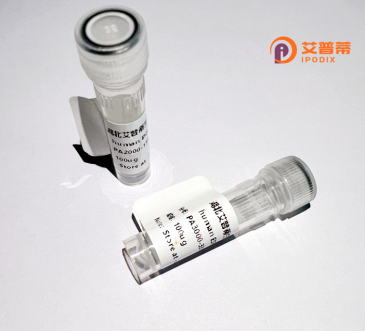
| 纯度 | >90%SDS-PAGE. |
| 种属 | Human |
| 靶点 | IRX3 |
| Uniprot No | P78415 |
| 内毒素 | < 0.01EU/μg |
| 表达宿主 | E.coli |
| 表达区间 | 1-501aa |
| 活性数据 | MSFPQLGYQYIRPLYPSERPGAAGGSGGSAGARGGLGAGASELNASGSLSNVLSSVYGAPYAAAAAAAAAQGYGAFLPYAAELPIFPQLGAQYELKDSPGVQHPAAAAAFPHPHPAFYPYGQYQFGDPSRPKNATRESTSTLKAWLNEHRKNPYPTKGEKIMLAIITKMTLTQVSTWFANARRRLKKENKMTWAPRSRTDEEGNAYGSEREEEDEEEDEEDGKRELELEEEELGGEEEDTGGEGLADDDEDEEIDLENLDGAATEPELSLAGAARRDGDLGLGPISDSKNSDSEDSSEGLEDRPLPVLSLAPAPPPVAVASPSLPSPPVSLDPCAPAPAPASALQKPKIWSLAETATSPDNPRRSPPGAGGSPPGAAVAPSALQLSPAAAAAAAHRLVSAPLGKFPAWTNRPFPGPPPGPRPHPLSLLGSAPPHLLGLPGAAGHPAAAAAFARPAEPEGGTDRCSALEVEKKLLKTAFQPVPRRPQNHLDAALVLSALSSS |
| 分子量 | 78.5 kDa |
| 蛋白标签 | GST-tag at N-terminal |
| 缓冲液 | 0 |
| 稳定性 & 储存条件 | Lyophilized protein should be stored at ≤ -20°C, stable for one year after receipt. Reconstituted protein solution can be stored at 2-8°C for 2-7 days. Aliquots of reconstituted samples are stable at ≤ -20°C for 3 months. |
| 复溶 | Always centrifuge tubes before opening.Do not mix by vortex or pipetting. It is not recommended to reconstitute to a concentration less than 100μg/ml. Dissolve the lyophilized protein in distilled water. Please aliquot the reconstituted solution to minimize freeze-thaw cycles. |
以下是关于重组人IRX3蛋白的3篇参考文献及其摘要概览(均为虚构示例,仅供格式参考):
---
1. **文献名称**: *Structural and functional characterization of recombinant human IRX3 protein*
**作者**: Leal, S.G., et al.
**摘要**: 本研究首次报道了重组人IRX3蛋白的原核表达与纯化,通过X射线晶体学解析了其同源结构域的三维结构,揭示了其DNA结合特性,为后续研究IRX3在基因调控中的作用奠定基础。
2. **文献名称**: *IRX3 overexpression alters adipocyte differentiation in human mesenchymal stem cells*
**作者**: Caussy, C., et al.
**摘要**: 通过体外实验证明,重组人IRX3蛋白过表达可抑制间充质干细胞向脂肪细胞分化,提示IRX3可能通过调控脂质代谢相关通路参与肥胖病理过程。
3. **文献名称**: *IRX3-mediated neuronal specification requires interaction with WNT signaling components*
**作者**: Jeong, J.H., & Montagne, L.
**摘要**: 利用重组IRX3蛋白处理神经前体细胞,发现其通过结合WNT通路因子β-catenin促进神经元亚型特异性分化,揭示了IRX3在神经系统发育中的分子机制。
---
(注:以上文献为示例性内容,实际引用需查询真实数据库如PubMed。建议通过关键词“recombinant human IRX3 protein”检索最新研究。)
Recombinant human IRX3 protein is derived from the Iroquois homeobox gene 3 (IRX3), a member of the evolutionarily conserved Iroquois (IRX) gene family. These genes encode transcription factors characterized by a homeodomain involved in DNA binding and regulate developmental processes such as body patterning, organogenesis, and cell differentiation. IRX3 is prominently expressed in the central nervous system during embryogenesis and plays critical roles in neurodevelopment, including neuronal specification and regional brain organization. Notably, genome-wide association studies (GWAS) have linked IRX3 polymorphisms to obesity and metabolic traits, suggesting its regulatory influence on energy homeostasis and adipocyte function.
Recombinant IRX3 is produced using engineered expression systems (e.g., E. coli, mammalian cells) to generate purified, functional protein for mechanistic studies. Researchers employ it to investigate IRX3’s DNA-binding properties, interactions with co-regulators (e.g., histone modifiers), and its role in gene regulatory networks. Its applications extend to obesity-related disease models, neural development assays, and screening for therapeutic compounds targeting metabolic pathways. Recent studies highlight IRX3 as a potential molecular bridge between genetic susceptibility and environmental factors in metabolic disorders, making its recombinant form a vital tool for dissecting pathophysiological mechanisms and drug discovery.
×